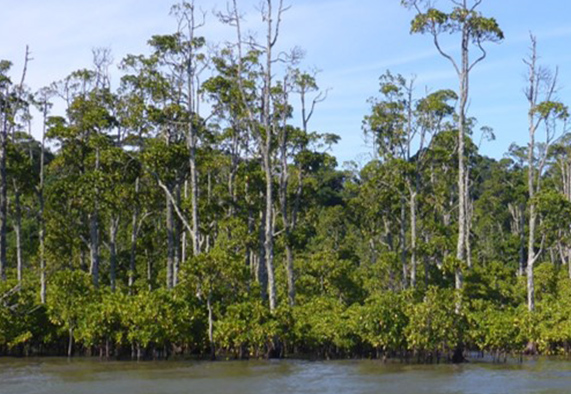Research aims
Ecosystem Design aims at either (re-)establishing simple communities in degraded areas to (re-)implement selected ecosystem services, or actively changing communities in earlier (re-)established or managed ecosystems with the same aim. Knowledge-driven conservation and management as depicted by the traffic light-concept, in turn, categorises ecosystems foremost based on their health and integrity status and forecasts thereof, and secondly their value as service-providers and forecasts thereof.
Thus, an extension of the ecosystem design approach would allow for actively intervening in protected areas open for sustainable use, in order to render these partially protected ecosystems better providers of selected services to local or regional societies or mankind worldwide.
ReMainMan tests the hypothesis that controlled and spatially limited clear-felling of old-grown tree patches (wood extraction for use by local stakeholders) will prove an efficient tool for the management of mangroves by maintaining and even improving the provisioning of certain ecosystem services through rejuvenating the forest community, including not only the trees but also the fauna and microbiota.
We assume that the community composition of the detritivorous fauna will, in addition to litter chemistry, affect the structure and fate of the organic matter that is sequestered in the sediment.
Further, the sediment fauna, along with environmental conditions (that are expected to change upon gap-formation), controls the composition and activity of the sediment microbiota that, in turn, is the major driver of decay and mineralization processes of organic matter.
An in-depth analysis of effects of gap-formation on fauna and microbiota will, thus, contribute to our ability to predict the effects of controlled spatially limited clear-felling on organic matter dynamics (as related to the ecosystem service of climate change-mitigation through the storage of climate-active gases in the sediment organic matter).
Project Partners (Germany) |
International Project Partners | |
|---|---|---|
Dr. Véronique Helfer (WG Mangrove Ecology) Michael Kyei Agyekum (Doctoral Candidate, WG Mangrove Ecology) plus MSc and BSc students (WG Mangrove Ecology) |
Dr. Aldrie Amir (UKM, Kuala Lumpur, Malaysia) Fiona Mackay (ORI, Durban, South Africa) Steven Weerts (CSIR, Durban, South Africa) Dr. Christophe Proisy (IRD, France) |





